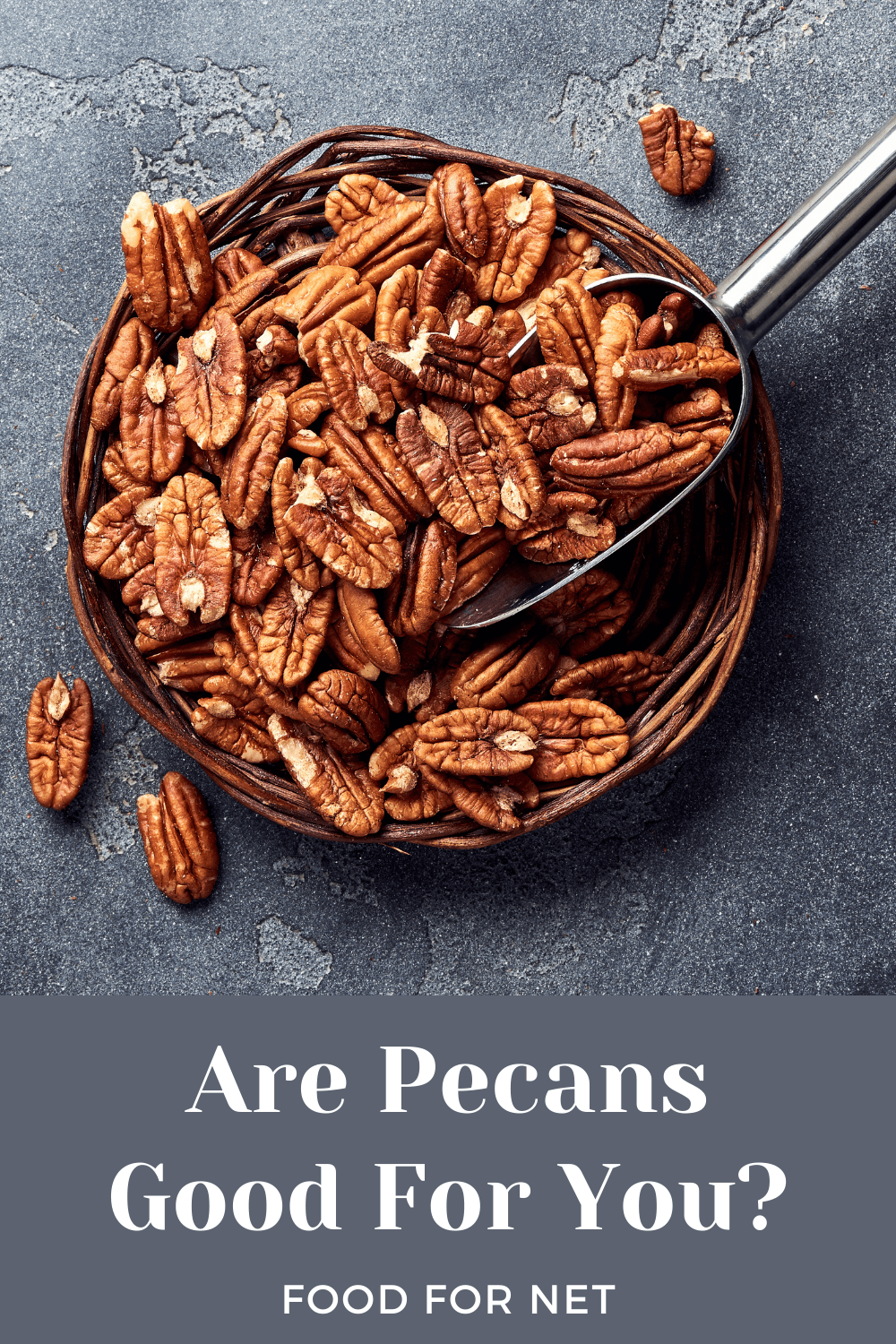
When you think of nuts, almonds and cashews are probably some of the first examples that come to mind (along with peanuts, even though these are actually legumes rather than true nuts). Pecans sometimes get left off the list, which is a shame, as they’re pretty impressive. Are pecans good for you?
Seriously, you don’t just get plenty of protein and nutrients from pecans, you’re also consuming barely any carbs. Plus, pecans can be used in baking and even in savory recipes, making them a versatile ingredient.
We must ask though, are pecans good for you? After all, nuts are high in fat and can easily lead to weight gain if you’re not careful.
To answer that question, we need to consider the way that the benefits and risks of pecans compare to each other. The amount you’re eating matters too. Think of it this way, eating large bags of pecans each day certainly won’t do your health any favors at all.
Are Pecans Good For You?
- Pecan Nutrition
- Benefits Of Pecans
- How Pecans Could Be Harmful
- How Do Pecans Compare To Other Nuts?
- How Many Pecans Should You Have Per Serving?
- Final Thoughts
Pecan Nutrition
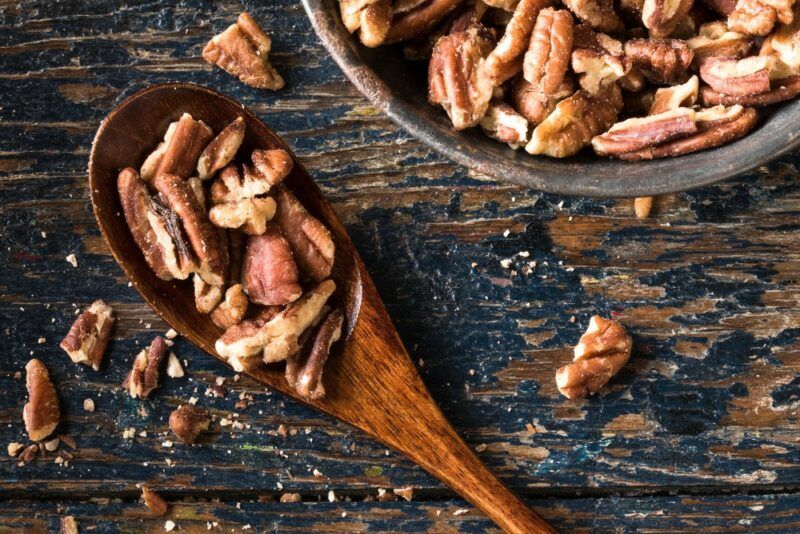
When talking about food, I love to start with the nutritional profile. There’s something satisfying about doing so, as the nutrients influence so many of the benefits and risks of the foods we eat.
For pecans, an ounce of the nuts gives you the following nutrient balance:
- Calories: 193
- Carbohydrates: 3.9 grams
- Fiber: 2.7 grams
- Sugars: 1.1 grams
- Fat: 20.2 grams
- Protein: 2.6 grams
You also get more than 60% of your daily requirements for manganese, 17% of your requirements for copper, and more than 5% for thiamin, zinc, magnesium, and phosphorous. It’s easy to see, then, why nuts are considered exceptional choices for nutrients.
Each nutrient plays a variety of roles in your body – far too many to talk about here. Getting enough nutrients is critical for staying healthy and well. Nutrient dense foods help matters a lot and pecans certainly fit that bill.
Benefits Of Pecans

A Source Of Healthy Fats
The fat content of nuts is easily the most alarming part of the nutritional profile. Things aren’t as bad as they look though, as most of that fat is in the form of monounsaturated fat.
In particular, in an ounce of pecans, you get 11.4 grams of monounsaturated fat, 6.1 grams of polyunsaturated fat, and only 1.7 grams of saturated fat. This is a powerful balance, as monounsaturated fats are associated with plenty of benefits. They may even help to decrease inflammation and lower your risk of heart disease.
A Fantastic Choice For Keto Dieters
The carb content of nuts varies somewhat, but pecans are a particularly good choice for low carb dieters. Many authors even call them the best possible nut for ketosis, which is an impressive recommendation.
This isn’t shocking either, as you get just 4 net grams of carbs in a 100 gram serving of pecans. The only other nuts with such low amounts of carbs per serving are Brazil nuts and they’re not nearly as easy to use (or as tasty).
Pecans are versatile too, so you’ll often see them feature in keto recipes. For example, you can use pecans to create a low carb crumb-like crust for chicken or fish. You can even make keto pecan pies, dessert bars, and candied pecans.
Are A Filling Snack
Nuts are one of the best snacks if you want something satisfying. After all, an ounce of pecans gives you around 2.5 grams of protein, along with a similar amount of fiber, and 20 grams of fat. It’s not surprising that even a handful of nuts quickly stops you from feeling hungry.
Plus, nuts are easy to eat on their own or with other ingredients (nuts and cheese is always a winning combination). This is much better than a complicated snack or one that needs to be cooked first.
May Help With Weight Loss
The protein content of nuts also makes them surprisingly powerful for weight loss. Why surprisingly? Well, you wouldn’t expect such a high fat and high calorie snack to help you lose weight, yet this is exactly what happens with nuts.
The reason is that when you eat satisfying snacks, like nuts, you decrease your appetite and may also reduce cravings for sugary treats. Try it for yourself. You might find that a handful of nuts keeps you full for hours, while you’re looking for more 30 minutes after eating potato chips.
Of course, this weight loss effect is only true if you keep a close eye on your portion sizes. Failing to do so could easily lead to weight gain rather than loss, as pecans are calorie dense.
Filled With Antioxidants
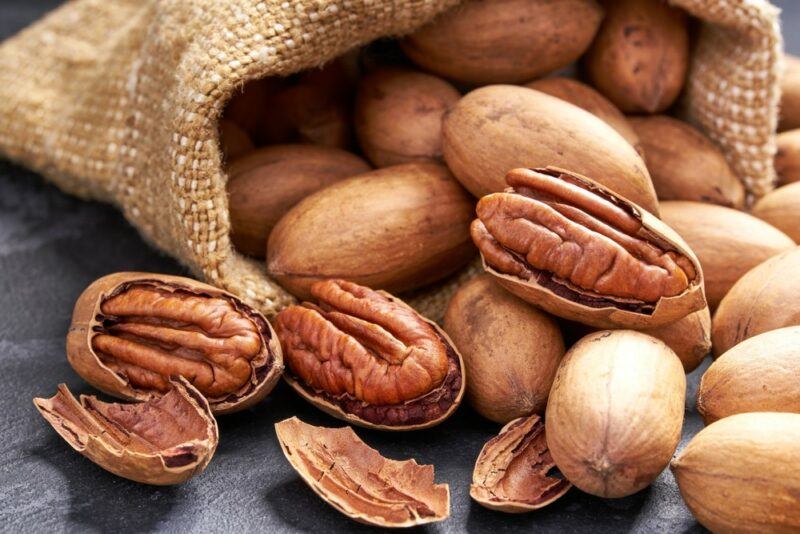
When we talk about antioxidants, it’s easy to assume that fruits and vegetables are the most powerful options. Yet, this isn’t always the case. You can find antioxidants in other places too, including nuts and legumes.
Antioxidants are important for the exact reason that their name implies – they help to reduce oxidation. Now, oxidation itself is a natural process, one that needs to happen to some degree. Antioxidants act to decrease dangerous levels of oxidation and protect our body from oxidative damage caused by free radicals.
The benefits are so significant that an antioxidant rich diet could even reduce your risk of disease.
Can Promote Heart Health
Despite their high fat content, nuts are often linked to improved heart health. One reason is the monounsaturated fat that we talked about earlier.
Some of the nutrients play a role in your heart health too. For example, potassium can help to decrease your blood pressure, which then lowers heart disease risk. Potassium also helps to reduce some of the negative effects of sodium (although, this doesn’t mean that you should overdo it with sodium).
Other nutrients are relevant too, along with the healthy fats and the antioxidants found in pecans.
Helpful For Diabetics
Pecans have a low glycemic index (GI) and are naturally low in sugar. These features make pecans perfect for diabetics. In particular, pecans aren’t going to spike your blood sugar in the way that higher GI foods do.
That’s not all. Pairing pecans with higher GI foods could help to lower the blood sugar impact of those foods. For example, having nuts with fruit means that the fruit has a much lower blood sugar effect than it would have on its own.
An Anti-Inflammatory Snack
Finally, nuts help with inflammation. Like oxidation, inflammation is an important natural process. However, too much inflammation can cause a host of problems and could even increase disease risk.
Foods that lower your inflammation are incredibly important these days, as so many other foods increase inflammation instead. The ability to reduce inflammation could even decrease the pain of some conditions, like arthritis.
How Pecans Could Be Harmful
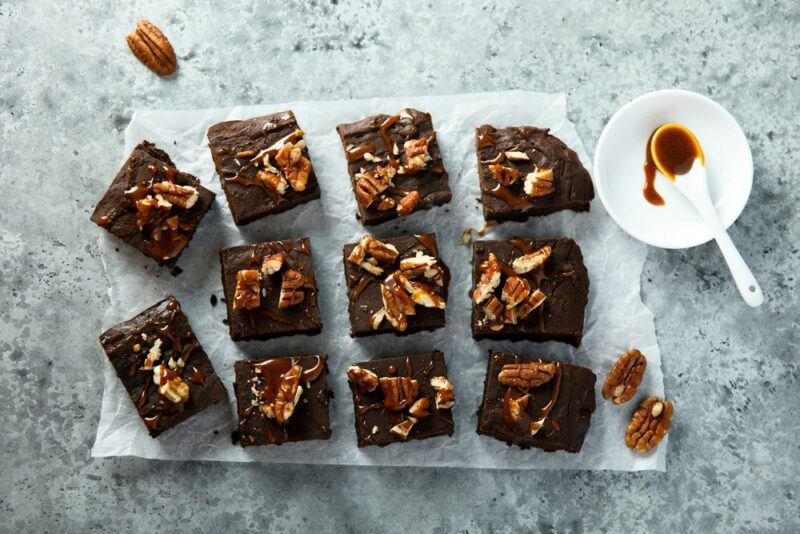
There are two sides to every story. While pecans do have some pretty amazing benefits, there are a few issues to watch out for as well.
The Calorie Content
Pecans are delicious, filling, and healthy. They’re also calorie dense, so it’s easy to consume more than you meant to, which could then lead to weight gain.
In particular, you end up with close to 200 calories in an ounce of nuts. That’s a decent amount of calories for not all that many nuts (roughly 15 pecan halves).
This pattern is true for other nuts as well and is why you should always be careful with your portions of nuts. It’s often best to portion out your nuts ahead of time, that way you don’t get carried away.
Some Products Contain Extra Ingredients
While pecans themselves are natural and relatively unprocessed, some pecan products contain extra ingredients. The pecans may have been coated in concerning oils. Glazed candied pecans may have other additives too, along with more sugar than you need.
This is why it’s always important to check the ingredients labels of any products you buy, even for something as simple as nuts.
How Do Pecans Compare To Other Nuts?
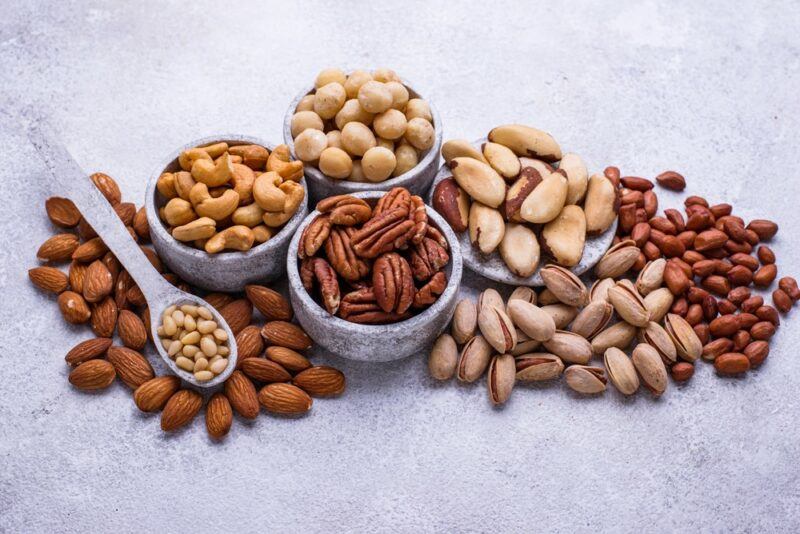
There are many types of edible nuts out there, including familiar nuts and more exotic ones. They all follow similar patterns, including being an excellent source of healthy fats and protein.
Here are some of the most common choices and some of their main features:
- Macadamia nuts. These nuts are incredibly high in fat and are low in carbs, making them popular for keto dieters.
- Brazil nuts are best known for their high selenium content. You can even meet your daily selenium target from a single Brazil nut. The low carb content of these nuts is often overlooked, but does make them excellent for keto dieters.
- Cashew nuts, on the other hand, are relatively high in carbs. They’re still seen as healthy though, partly because of their phytosterol content. The softness of cashews makes them a versatile ingredient, especially useful for making vegan cheese and many other dishes.
- Almonds are sometimes seen as the healthiest nut, partly because of their nutrient density. They are amazing in this sense, but don’t discount other nuts, as all types contain plenty of nutrients.
- Pistachios contain less fat than most other nuts and are lower in calories too. They stand out because of their antioxidant content, so may offer some benefits that you don’t find with other types of nuts.
- Walnuts are often linked to improved brain health (and not just because of their shape). They’re a good source of antioxidants too.
- Finally, pecans are low in carbs and contain some interesting nutrients, including zinc.
Are pecans better than other types of nuts?
Honestly, that’s not the right question to ask. The various types of nuts are simply different. They all have some powerful features, along with some less attractive ones.
Rather than trying to find the best possible type of nut, why not focus on variety instead? This way you’re getting benefits across the board.
How Many Pecans Should You Have Per Serving?
Most recommendations suggest you stick to roughly an ounce of nuts per day. For pecans, this is somewhere between 15 and 19 pecan halves.
An ounce gives you plenty of nutrients and protein, without going overboard with fat and calories. You could go up to 1.5 ounces, but more than that probably isn’t wise.
There’s one important point though – the recommendation is for an ounce of nuts per day, regardless of the type. This means you shouldn’t have an ounce of pecans, another of almonds, and another of cashews. That pattern would increase your calorie intake far too much.
Of course, the exact serving may vary depending on your needs. If you’re following a very low calorie diet, for example, an ounce of pecans could be far too much. In contrast, some keto dieters may comfortably be able to enjoy larger serving sizes, which may help them to balance their macros as well.
Final Thoughts
Like other nuts, pecans offer plenty of benefits. Their combination of protein, fat, and fiber makes them a filling snack, one that’s much better than all the sugary processed alternatives out there. Pecans also contain plenty of nutrients and even some antioxidants.
We can’t forget about the carb content either. Pecans contain fewer carbs than most other nuts, making them ideal for keto and other low carb dieters.
The main problem is the same one that befalls all nuts, the high calorie content. This means you need to be cautious with your serving sizes, to make sure you don’t overdo it. If you keep to around an ounce of nuts per day, however, you’re likely to see many benefits from pecans without much risk at all.
Frequently Asked Questions
Are Pecans Good For Diabetics?
Nuts naturally have a low glycemic index, so they won’t spike your blood sugar. This makes them ideal for diabetics.
Having pecans with or before a meal could even decrease the blood sugar impact of the meal. Of course, you’ll still need to watch the portion size to make sure your calorie intake isn’t too high.
Do Pecans Go Bad?
Pecans will eventually go bad, as the fat they contain will oxidize. When this happens, they go rancid and develop a bitter flavor. Eating a rancid nut isn’t a big issue, but you shouldn’t have too many of them.
Still, pecans do have a decent shelf life. If you keep them at room temperature, shelled pecans will last around 3 months. Storing them in the fridge gives you much longer – around a year.
If the pecans are still in their shell, they’ll last around 4 months at room temperature and more than a year in the fridge.
Are Pecans Low FODMAP?
Pecans are low FODMAP, just like hazelnuts and Brazil nuts. You can consume up to 10 pecan halves without any issue.
Are Pecans Gluten Free?
All nuts are naturally gluten free, including pecans. However, things can change when nuts are processed. For example, wheat flour is sometimes used in the coating for dry roasted nuts, which means these sometimes aren’t gluten free.
There’s also the risk of cross contamination. To avoid this, look for companies that use a gluten free label and those that don’t produce any gluten containing products.
How Many Carbs Are In Pecans?
Pecans are very low in carbs, giving you just under 4 grams of carbs per ounce of pecans. That’s impressive, especially as roughly 2.7 grams of these carbs come from fiber.


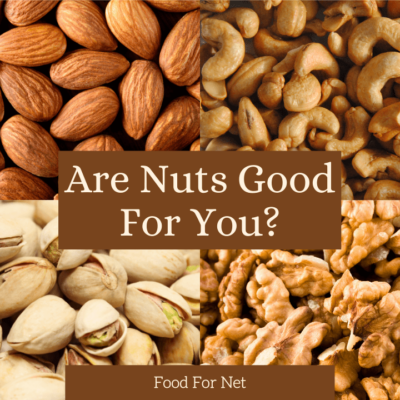




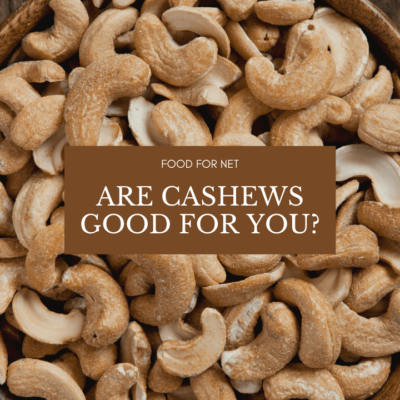

 14 Types of Low Fructose Foods and Helpful Tips for the Fructose Intolerant
14 Types of Low Fructose Foods and Helpful Tips for the Fructose Intolerant
Leave a Reply